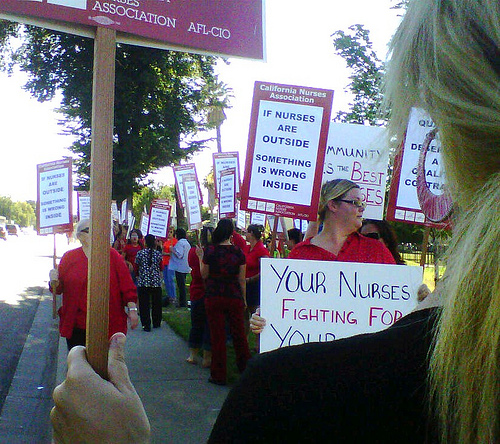News
Nurses protest at Rideout

By Nancy Pasternack/ADnpasternack
August 06, 2012 11:10:05 PM
About 50 registered nurses, nursing assistants and their families demonstrated Monday with picket signs across the street from Rideout-Memorial Hospital in Marysville.
The nurses protested staffing shortages and related conditions at Rideout-Memorial Hospital, as well as insufficient wages and benefits packages offered by the Fremont-Rideout Health Group.
"When we take a break during a shift, someone is supposed to relieve us, but that's not happening," said Stephanie Price, a registered nurse who has worked at the Marysville hospital for seven years. "The patients are left alone."
The lapses, and other problems at the hospital, Price said, result from a staffing shortage, and the hospital's practice of hiring traveling nurses — non-union temporary employees.
Those claims are false, according to FRHG CEO Terri Hamilton. The hospital has used an unusual number of traveling nurses recently, but their competence and experience are solid, she said.
"Traveling nurses tend to be more experienced," than staff nurses, she said. "They are very accustomed to new environments." Adapting, she said, "is what they do for a living."
Staff registered nurse Nancy Finlay disagreed.
"The problems are getting much worse," she said at the demonstration on Fifth Street at Veteran's Park.
Finlay, a nurse with 35 years experience — five at Rideout — said she worked a shift Sunday night where she was one of two regular staff nurses running the show with three travel nurses.
Temporary travel nurses lack training in the hospital's — and sometimes the state's — policies and procedures, she said.
Finlay said those on her shift failed to check and sign off on doctor's orders. The procedure is one of many she said she and other staff nurses are in the awkward position of having to try and correct on a regular basis.
The lack of continuity and consistency with care from regular and temporary nurses, she said, is troubling.
"We want our patients to feel safe," Finlay said.
Nurses on Monday also pointed to a recent citation from the California Department of Health concerning staffing policies for cardiovascular telemetry patients at Rideout.
The nurse-to-patient ratio, by law, must be higher for such patients than for others.
"It was a difference in interpretation," said Hamilton, who said hospital management believed the ratio applied only when an entire telemetry ward, or unit, is concerned.
Since the citation in May, the policy has been changed, Hamilton said.
"Things change in health care, and we need to stay compliant. That's what we're doing," she said.
Hamilton said many of the staffing concerns expressed by the nurses soon will be moot.
In July, FRHG hired 30 new registered nurses, including 12 who are newly graduated from nursing school, she said.
Some are expected to start work in early September, and take the place of nurses who are working on temporary contracts.
After more than a year of negotiations on a new contract to replace the one that expired in December, an impasse was declared by FRHG in April.
The resulting contract that went into effect recently raised base wages by 4 percent and included new profit-sharing plans.
Those protesting Monday said it was not sufficient to compensate for conditions at the hospital.
Hamilton said the underlying issue is the California Nursing Association's demand that all nurses at the hospital be required to join the union.
"We haven't agreed to that, and we won't," she said.